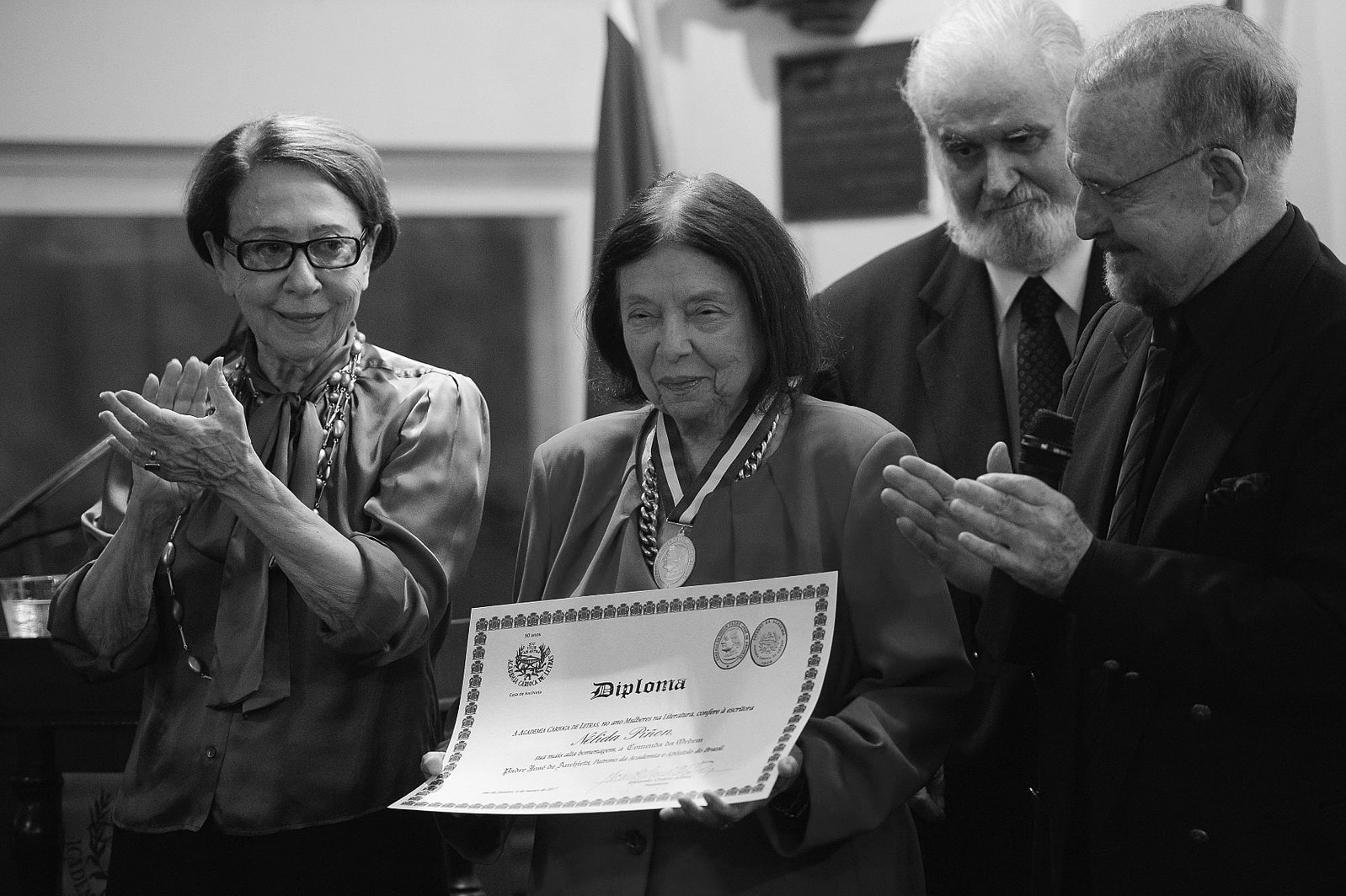While it might be said that Nélida Piñon was a Catholic writer, she was certainly not one set in the customary mould – or indeed in any mould at all. Certainly the faith of her Galician immigrant family influenced her work – many of her books were infused with themes of Christian mysticism and spirituality – but she was interested in religion not only as an expression of faith but also as a springboard for storytelling. A religious foundation often provided a starting point for an exploration that took her writing well beyond traditional expressions of religious belief.
Born in Rio de Janeiro – where Paul Landowski’s enormous statue of Christ the Redeemer dominates the landscape for miles around – Piñon wrote fiction from her childhood, inspired by an unquenchable thirst for books. She particularly enjoyed fantasy stories: “above all, the impossible narratives and, who knows, even the illogical ones,” she explained. “Because the absence of logic gave the story more power.” After graduating from the Pontifical Catholic University of Rio de Janeiro, she cut her teeth writing for magazines and newspapers.
Following her love of fantasy, Piñon’s first novel – <em>Guia-mapa de Gabriel Arcanjo</em> (Guide Map of The Archangel Gabriel, 1961) – explored themes of dogma and dissent. Mariella, its protagonist, enters into conversation with Gabriel; they both discuss her yearning for a life away from Christian dogma. It was a soft start: in <em>Madeira feita cruz (Wood made into a Cross,</em> 1963) and<em> Fundador</em> (The Founder, 1969) main leading characters set themselves up as leaders of new religions. Fundador won the Brazilian Walmap Prize in 1970.
Other books were more obviously explicit. In <em>A casa da paixão</em> (The House of Passion, 1972) Piñon explored a young woman’s dawning sexual awareness – it won the Braz-ilian Association of Art Critics’ Mário de Andrade Prize in 1973 – while other erotic works included <em>A força do destino (The Force of Destiny</em>, 1977).
She also composed short stories: her first collection, Tempo das frutas (Season of Fruit) appeared in 1966.
Piñon’s co-option of religious imagery – to say nothing of the overt sensuality of much of her writing – was deeply daring in Catholic Brazil, which was ruled by a military dictatorship between 1964 and 1985. Again drawing on religious metaphors, she once described her choice of career as having “opened the doors of paradise and, at the same time, of hell”. “I always lived with intensity,” she once said.
She was also passionate about advancing her native Portuguese. <em>A república dos sonhos (The Republic of Dreams</em>, 1984) showcased particularly her skill with the language’s cadences and her deft command of its complicated nuances. A semi-autobiographical tale of a family that leaves Galicia and settles in Brazil, it won the Brazilian PEN Club award a year later. Three years later <em>A doce canção de Caetana</em> (<em>Caetana’s Sweet Song</em>) won the Brazilian Writers’ Union prize.
Despite her attachment to Portuguese, however, Gregroy Rabassa (who had also introduced the works of Gabriel García Márquez to the Anglosphere) began to translate her work into English from the 1970s.
Although she was regarded in many quarters as a pioneering trailblazer, Piñon never quite achieved the worldwide acclaim of writers like Márquez, Isabel Allende, Mario Vargas Llosa or Julio Cortázar. That said, her books were translated into 30 languages and still found a wide and appreciative audience. In 1995 she became the first woman (and first Brazilian) to win the Mexican Juan Rulfo Prize for Latin American and Caribbean Literature, and she was awarded the Galician Rosalía de Castro Prize in 2002. In 2005 <strong>Piñon</strong> received the Prince of Asturias Prize for Literature from Prince Felipe – now King Felipe VI – of Spain.
Although Rio remained her home, Piñon travelled widely. Between 1990 and 2003 she taught at the University of Miami, and she held visiting lectureships at Georgetown, Columbia and Harvard. She died in Portugal, where she had spent periods of study for her 2020 novel Un día llegaré a Sagres (One day I’ll get to Sagres). Her research was meticulous: for Vozes do deserto (Voices of the Desert, 2004), an erotic retelling of The Arabian Nights, she read the Koran twice.
It is perhaps not an exaggeration to say that Piñon was one of South America’s most distinguished contemporary writers: she joined the Brazilian Academy of Letters, with its distinctive green-and-gold uniform, in 1989, and later became its first woman President. Her other artistic tastes varied widely, and ranged from old westerns to Wagner.
<strong>Piñon</strong> never married, preferring to focus on her writing, while some of her many friends scattered across the world described her as “dynamic and restless”. Her subjects were controversial, and frequently sat uneasily with a more conventional practice of the Catholicism that has for centuries nurtured Brazilian religious life. Nevertheless, after her death in Lisbon at the age of 85, her obsequies were those of the Church.
Nélida Cuiñas Piñon, May 3, 1937 – December 17, 2022



